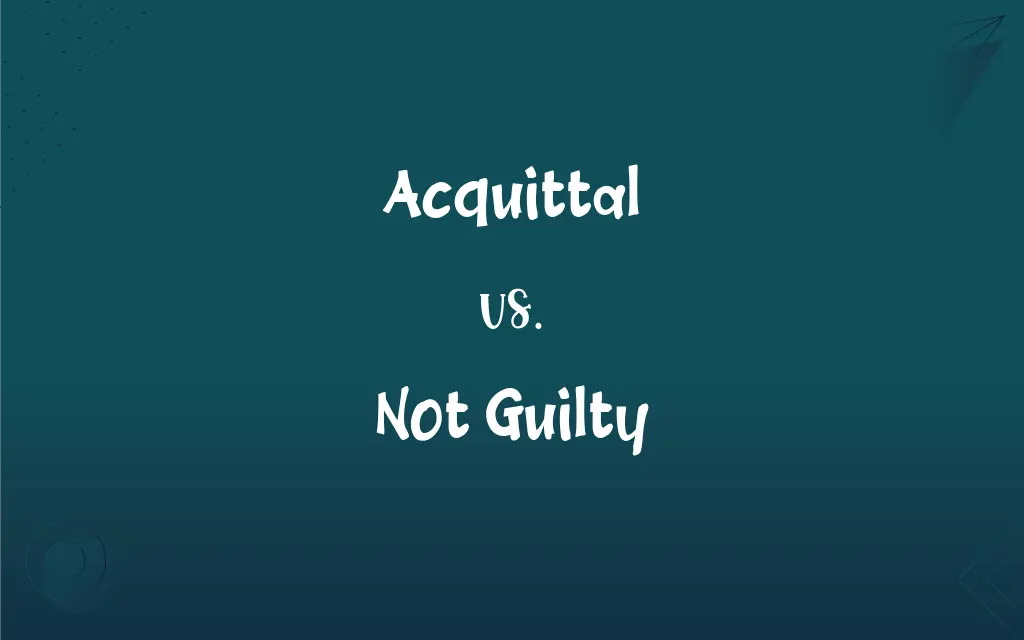Acquittal vs. Not Guilty: What's the Difference?
Edited by Aimie Carlson || By Janet White || Published on November 6, 2023
Acquittal; A legal judgment of innocence. Not Guilty; A verdict indicating the defendant did not commit the crime.

Key Differences
An acquittal represents a formal judgment that concludes a criminal trial, stating that the defendant has been found not guilty of the charged offense. Not Guilty: "Not guilty" is a verdict given by a jury or judge which asserts that the prosecution failed to prove the defendant's guilt beyond a reasonable doubt.
An acquittal can be the result of a number of circumstances during a trial, including a lack of evidence or faulty evidence. Not Guilty: When a person pleads "not guilty" at the onset of a trial, it requires the prosecution to prove the individual's guilt.
It is the end result and the person cannot be tried again for the same crime due to the double jeopardy clause. Not Guilty: A "not guilty" verdict leads to an acquittal, but the term itself is a declaration during the trial process.
This term is broader, encompassing other reasons for release from guilt, like legal errors during the trial. Not Guilty: This term specifically points to the conclusion that the defendant didn't commit the crime based on the evidence presented.
An acquittal can sometimes be controversial, especially if the public believes the defendant was guilty. Not Guilty: The plea of "not guilty" simply initiates the legal process, allowing the accused an opportunity for defense.
ADVERTISEMENT
Comparison Chart
Nature
Legal judgment
Verdict
Given By
Judge or Jury after trial
Jury or Judge during trial
Implication
End of trial without conviction
Declaration of innocence based on presented evidence
Follow-up Trials
Not possible for the same crime
N/A, as it leads to acquittal
Associated Phase
Conclusion of the trial
Declaration phase in court, leading to the trial
ADVERTISEMENT
Acquittal and Not Guilty Definitions
Acquittal
A judgment that a person is not guilty of the crime with which they have been charged.
Despite the public's outcry, the acquittal was based on legal procedures.
Not Guilty
The conclusion that the prosecution hasn't proved guilt beyond a reasonable doubt.
Based on the evidence, the verdict was Not Guilty.
Acquittal
A formal declaration of innocence in a criminal trial.
After a lengthy trial, the defendant celebrated his acquittal.
Not Guilty
A declaration that dismisses criminal responsibility.
She was relieved when the jury's decision was Not Guilty.
Acquittal
The act of discharging someone from a criminal charge.
The acquittal came as a relief to the accused's family.
Not Guilty
A plea asserting innocence in response to a criminal charge.
He entered a plea of Not Guilty at the beginning of the trial.
Acquittal
A decision by a judge or jury that a defendant is not culpable.
The unexpected acquittal surprised many in the courtroom.
Not Guilty
An assertion denying the commission of a crime.
His consistent claim was that he was Not Guilty.
Acquittal
A release from a charge after a verdict in court.
The evidence was insufficient, leading to his acquittal.
Not Guilty
A verdict stating the defendant did not commit the alleged act.
The jury declared him Not Guilty after deliberations.
Acquittal
Judgment, as by a jury or judge, that a defendant is not guilty of a crime as charged.
Acquittal
The state of being found or proved not guilty.
Acquittal
The act of fulfilling the duties (of a given role, obligation etc.).
Acquittal
(legal) A legal decision that someone is not guilty with which they have been charged, or the formal dismissal of a charge by some other legal process.
Acquittal
Payment of a debt or other obligation; reparations, amends.
Acquittal
(historical) The act of releasing someone from debt or other obligation; acquittance.
Acquittal
(rare) Avoidance of danger; deliverance.
Acquittal
The act of acquitting; discharge from debt or obligation; acquittance.
Acquittal
A setting free, or deliverance from the charge of an offense, by verdict of a jury or sentence of a court.
Acquittal
A judgment of not guilty
FAQs
What is an Acquittal?
An Acquittal is a formal judgment of innocence in a criminal trial.
Is a Not Guilty plea the same as an Acquittal?
No, a "Not Guilty" plea asserts innocence at trial's start, while an Acquittal is the trial's conclusion without conviction.
What does Not Guilty mean?
"Not Guilty" is a verdict indicating the defendant did not commit the alleged crime.
Can someone plead Not Guilty when they committed the crime?
Yes, "Not Guilty" is a legal plea, not necessarily an admission of factual innocence.
Can an Acquittal be appealed?
Typically, in the U.S., a prosecution cannot appeal an Acquittal due to double jeopardy protections.
Can public opinion influence an Acquittal?
Ideally, Acquittals are based on evidence and law, but public sentiment can sometimes indirectly influence proceedings.
Is a "hung jury" the same as a Not Guilty verdict?
No, a "hung jury" is undecided, while "Not Guilty" is a decisive verdict leading to Acquittal.
Is "Not Guilty by reason of insanity" the same as Not Guilty?
No, "Not Guilty by reason of insanity" means the defendant committed the act but was mentally ill at the time.
Can someone be retried after an Acquittal?
No, after an Acquittal, due to the double jeopardy clause, one cannot be retried for the same crime.
Does an Acquittal mean the defendant is innocent?
An Acquittal means the prosecution didn't prove guilt beyond a reasonable doubt; it doesn't confirm factual innocence.
Does Acquittal restore all rights to a defendant?
Generally, an Acquittal lifts the legal penalties of the crime charged, but collateral consequences might persist.
Are Acquittals common in criminal trials?
Acquittals vary by jurisdiction and the nature of the crime but are not uncommon.
How does a jury decide on a Not Guilty verdict?
A jury declares "Not Guilty" if the prosecution fails to prove guilt beyond a reasonable doubt.
Can an Acquittal be seen as a failure of the justice system?
Views vary, but an Acquittal can also be seen as the justice system ensuring rights and due process.
Does Not Guilty mean the crime didn't happen?
No, "Not Guilty" means the defendant wasn't proven to commit the crime, not that the crime didn't occur.
Can there be an Acquittal even if some evidence suggests guilt?
Yes, an Acquittal can occur if the evidence doesn't prove guilt beyond a reasonable doubt.
Does a Not Guilty verdict mean the investigation was flawed?
Not necessarily; "Not Guilty" means the evidence presented didn't meet the threshold of proof beyond a reasonable doubt.
Are there crimes where a Not Guilty plea is rarely successful?
Success varies by evidence, not necessarily by crime, but some offenses may have higher conviction rates.
Why would someone choose a Not Guilty plea?
A Not Guilty plea allows the accused to challenge the prosecution's evidence and provide a defense.
How do defendants feel post-Acquittal?
Feelings vary; relief is common, but some may feel stigmatized despite the Acquittal.
About Author
Written by
Janet WhiteJanet White has been an esteemed writer and blogger for Difference Wiki. Holding a Master's degree in Science and Medical Journalism from the prestigious Boston University, she has consistently demonstrated her expertise and passion for her field. When she's not immersed in her work, Janet relishes her time exercising, delving into a good book, and cherishing moments with friends and family.
Edited by
Aimie CarlsonAimie Carlson, holding a master's degree in English literature, is a fervent English language enthusiast. She lends her writing talents to Difference Wiki, a prominent website that specializes in comparisons, offering readers insightful analyses that both captivate and inform.






































































